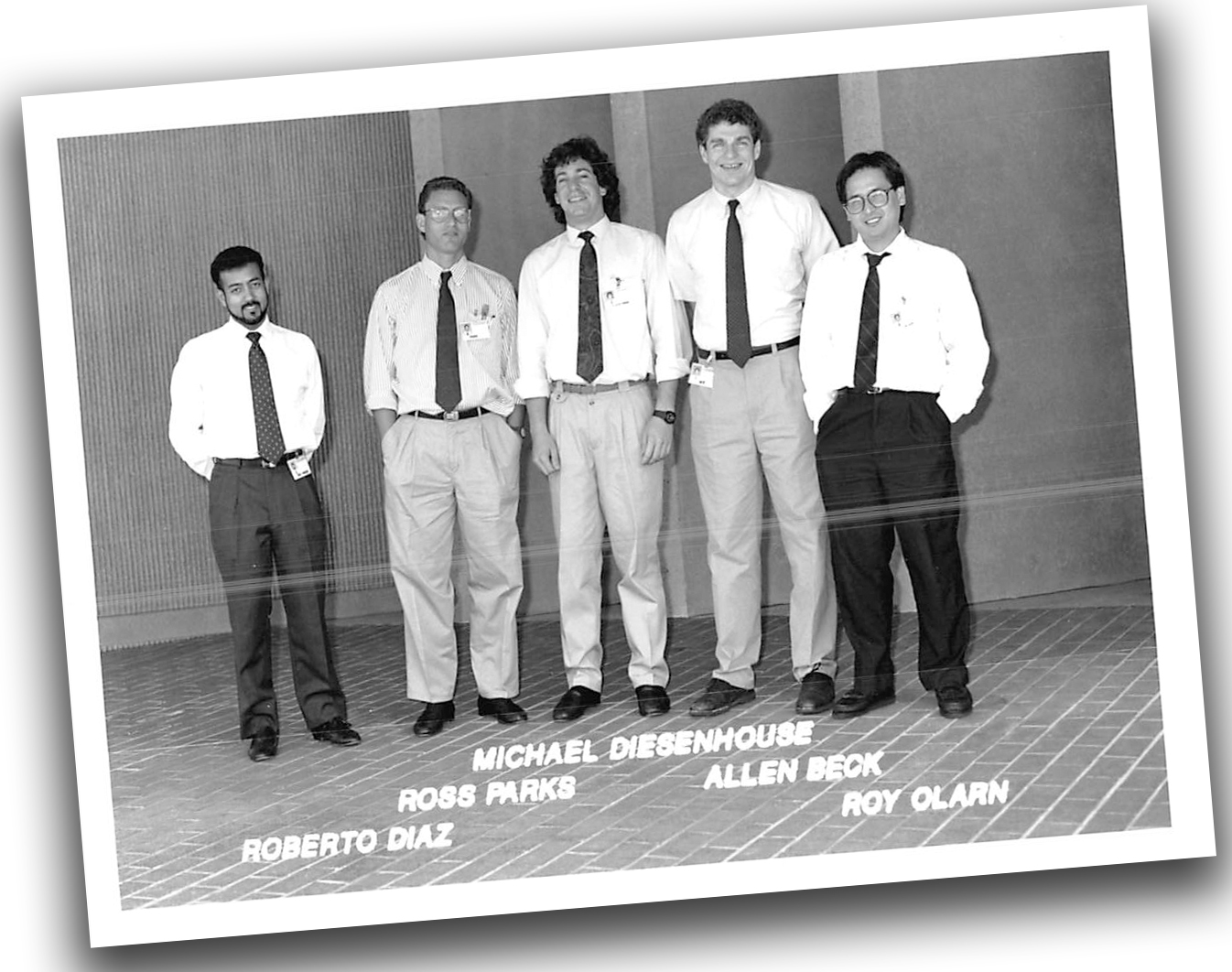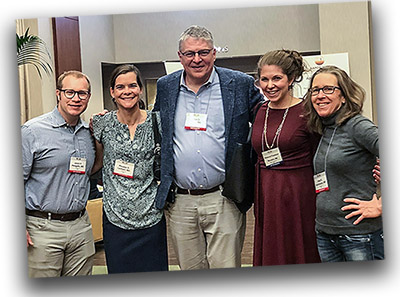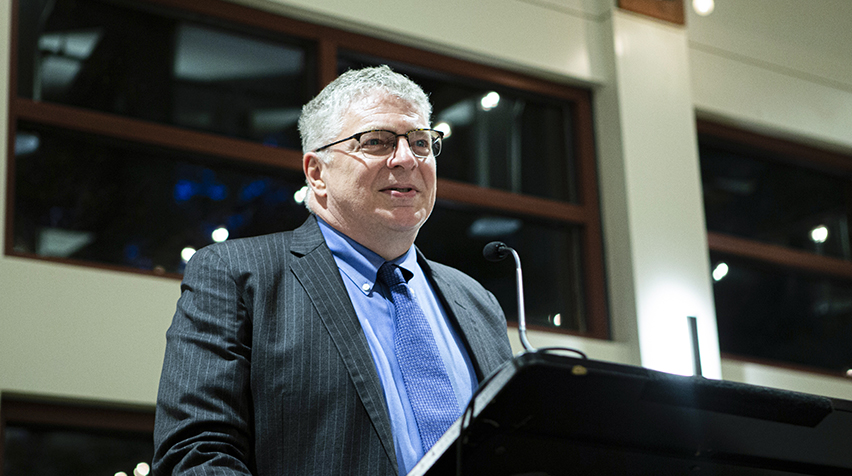
When Allen Beck first enrolled in the Emory School of Medicine, he thought he had a good idea of what lay ahead. He would learn how to be a good clinician. In the back of his mind, the young med student even toyed with the idea of one day returning to Tennessee to work alongside his father, Larson Dale Beck, an ENT doctor in private practice.
My Dad had gone to med school after serving in the Korean War, and I think that really influenced the type of medicine he wanted to practice. He was a clinician, working directly with the people in his community," he said.
I thought that's what I would do, too. But I had this stupid notion that I was limited to either seeing patients in a clinic or doing pathology research in a lab. There was no in-between. I had no idea what academic medicine was.
Thirty-seven years and thousands of patients later, the now-chair of the Emory Department of Ophthalmology will tell you that in-between
is what gets him up in the morning. Academic and clinical medicine are at the heart of Emory Eye Center's legacy - and its future.
If we really want to help patients, we have to keep pushing ourselves to train new practitioners, research new options, and listen closely to what patients can teach us. That's what academic medicine is all about, and the more I became involved in it at Emory - as a med student, a resident, and a glaucoma fellow - the more I was convinced of its impact,
he said.
Burnishing good training with great questions
As a resident, Allen Beck found his Emory preceptors shared his fascination with tackling problems aggressively, and from every angle. If it was a surprise, it was a good one. Attending physicians didn't take offense when a resident questioned a technique or procedure. They expected it.
We had a male urology patient who had a catheter put in after surgery. Now most consulting doctors would know not to touch anything the surgeon put in, but the attending physician that day told me to take it out. I didn't think it was the right thing, but I did what I was told. When the urologist found out, he blew up at me. When I told him my attending told me to do it, he said something I'll never forget: 'You are a doctor now. You're supposed to think, to question. Don't you ever do something like that again.''
As he tells it, it's clear the experience shaped Allen Beck as a clinician. Henceforth, if he had a question, he would ask it. And he would demand the same of his proteges.
That patient ended up doing fine, but the whole incident taught me to be more independent in my analysis of patient care. Even strong medical training will not translate to good patient care if the clinicians don't speak up. That's why we study so hard, memorize so much - so we'll have the knowledge to challenge one another when it matters most.
Emory has trained me.
Teaching has taught me.
In his chosen specialty of glaucoma, Beck sees the embodiment of Emory Eye Center's core mission: personalized patient care, rigorous clinical research, and exemplary clinician training.
I was drawn to specialize in glaucoma because I knew that, as the physician, I would play an integral part in my patients' lives. It's a chronic incurable disease, and when I've been able to save some one's sight - or even sometimes bring it back - it's very rewarding.
At the same time, Emory Eye Center's commitment to glaucoma research has opened up the options I can bring directly to my patients. Our clinical researchers have been involved in almost every glaucoma eye drop that's now available.
Allen Beck pauses a minute before continuing. Once upon a time, he didn't know what academic medicine was. Now, he's an academic. And he loves it.
If we really want to help patients, we have to keep pushing ourselves to train new practitioners, research new options, and listen closely to what patients can teach us. That's what academic medicine is all about, and the more I became involved in it at Emory - as a med student, a resident, and a glaucoma fellow - the more I was convinced of its impact,
he said.
Once I was through, and I had been practicing for a couple of years, I realized how much I'd gained from my own training at Emory. That's when I realized I had something to teach. And it was important to me to do it. I really wanted to make a difference, to train some really great eye doctors and some really great glaucoma specialists. Every year, I get that chance, and it never disappoints. I'm introduced to another group of doctors who are as ready as I ever was to ask the tough questions. I'm happy to say, teaching them has really taught me.
And the next 150 years?
When we asked Allen Beck to tell us what's in store for the next 150 years, he gave us a wry smile. He believes Emory Eye Center has limitless potential, but he's not one to put out frothy quotes simply to grab attention. He's been thinking very seriously about the next ten, and he's identified three very attainable goals.
HEALING: EXPANSION OF CLINICAL CARE
Clinical care is what got me into medicine, it's in my blood. And I know it to be very important to all of my colleagues. For our patients, it's important that our care be timely, accessible, and comprehensive. They already trust the quality of our clinicians, which is something we will never take for granted.
But Emory Eye Center is not yet big enough to provide the access to care that is demanded of us as a regional referral center. The talent, the expertise, the experience - are all here. But the physical size of our facilities limits our ability to recruit a sufficient number of clinicians to meet the demand. It also limits our ability offer the full spectrum of specialty and routine ophthalmic care. We have expanded some of our facilities, but our primary goal is to establish a free-standing clinic where we can provide a seamless continuum of specialty care.
TEACHING: EXPANSION OF CLINICAL TRAINING
We've been doing a great job with clinical training for a long time, but the need to improve never stops. We cannot afford to take our focus off of it, particularly if we want to eventually meet our need for expanded clinical care. We've already expanded our fellowship programs, which is a good start. It's probably time to expand our residency program as well. We are attracting great candidates, so I'm not concerned about quality. This will put more clinicians into rotation, which will give an immediate boost to our clinical coverage.
LEARNING: EXPANSION OF BASIC AND CLINICAL RESEARCH
Over the last year, we have been steadily adding new research scientists to our basic and clinical research section - men and women who've been investigating not only the mechanisms of different eye diseases, but the ways we as clinicians an intervene. Now, we are about to name a new director for that program. These investments have tremendous potential for making our research program one of the best in the country.



